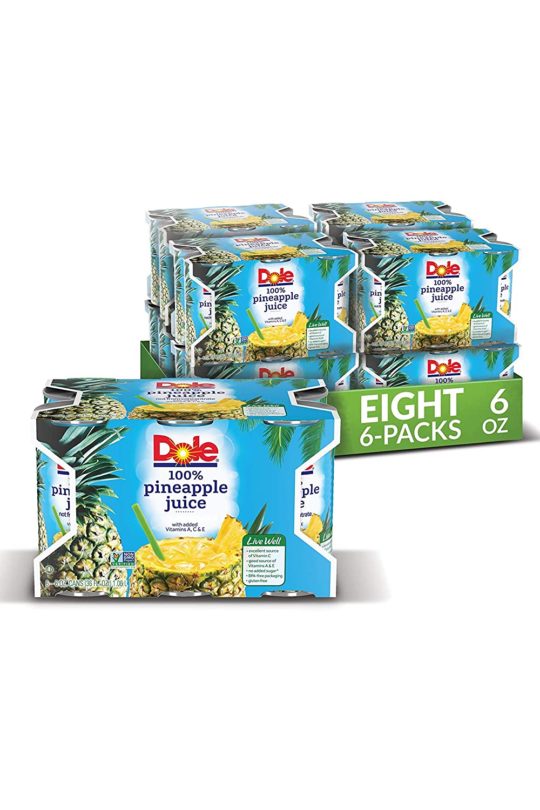Updated on April 9th, 2023
Tenderizing is the process of softening a cut of meat by breaking down its interior fibers to make it easier to eat and digest. This process is helpful when cooking tough cuts of steak or recipes that involve a thin slice of meat, such as chicken cutlets for chicken Parmesan or veal Milanese. There are different ways to tenderize meat, including slow cooking, marinating, and pounding. While you can tenderize meat at home using a meat mallet or rolling pin, some manufacturers handle the process by using mechanical tenderization, which involves breaking down the meat’s connective tissue with sharp blades.
Meat tenderizer refers to a powdered naturally derived enzyme. The enzyme most commonly used is papain, which comes from papayas, or bromelain, which comes from pineapples. Meat is sprinkled with the powder, and the enzymes help to break down the meat fibers. The same result can be obtained by marinating meat in papaya or pineapple juice. Tenderizer products can be purchased with or without seasonings. The term “plain” meat tenderizer refers to any unseasoned meat tenderizer.
Sometimes the term meat tenderizer is used to describe a meat mallet, which is alternately used to pound and flatten meat to make it tenderer. You also just use the side of a small plate or saucer, which works pretty well too. Meat shouldn’t be marinated in an acidic liquid like apple cider vinegar, wine, or lemon juice for more than a couple of hours, since the acidity will then make it tough. If the marination time needs to be extended for more flavor, the marinade should include oil, rather than an acidic liquid.
Commercially produced meat tenderizer powders contain many undesirable food additives, like preservatives, salt, and Monosodium glutamate (MSG). Excessive consumption of MSG can result in headaches, swelling in the face/throat, tingling or burning sensation in the face, neck, or other areas, facial tightness, rapid heartbeat, numbness, etc. Excessive intake of salt can cause heart attacks, strokes, and kidney diseases through high blood pressure. So, it is always better to consume natural food products as meat tenderizers.
Meat Tenderizer Substitutes
If you run out of regular meat tenderizers or simply want a substitute with less harmful chemicals and all-natural ingredients, these substitutes below will do.
Good Ol’ Meat Mallet
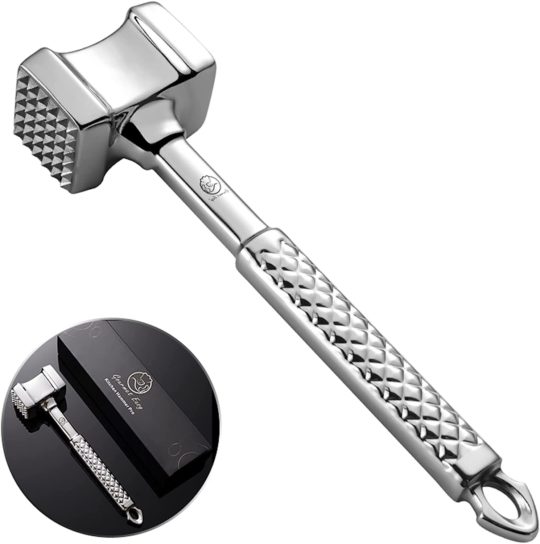
You can use a handy tenderizer like a meat mallet (wooden or metallic instrument) for pounding the meat. Cut the meat into small slices and cover each slice with a plastic sheet before using the mallet on it. The pounding action flattens the meat and breaks apart the fibers and connective tissues present in it.
Pineapple juice
Another common enzyme that is found in commercially produced meat tenderizers is ‘bromelain.’ It is obtained from pineapples. So, cut a pineapple, remove the rind, put the wedges in a blender, and apply the pulp over the surface of the meat. You can pour pineapple juice over the meat and refrigerate it for 1 – 2 hours, depending upon the type of meat. Do not use canned or cooked pineapple, as the enzymes present in the fruit do not function after processing (heating).
These fruits all have papain, an enzyme that’s used in commercial tenderizing products. Like acids and salt, this enzyme breaks down tough muscle fibers. Method: Apply fruit slices or mash to the beef and leave for a few hours. Using fruit works best when applied to thin beef cuts.
Dairy-Based Marinades
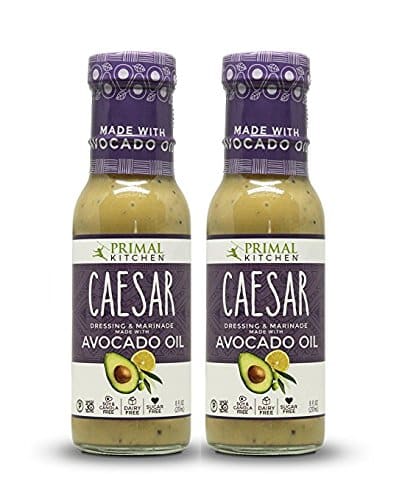
These can be considered the best meat tenderizers. They are more tenderizing than fruit juices or other acidic marinades. Traditionally, yogurt is used to marinate meat in Indian cuisine. Similarly, buttermilk is used to tenderize chicken before frying. When it comes to Italian cuisine, milk-braised meats are tenderers than those cooked with wine or tomatoes. These contain some acidity but they are also dairy items with calcium content, this activates enzymes within the meat that also helps break down protein.
Baking Soda
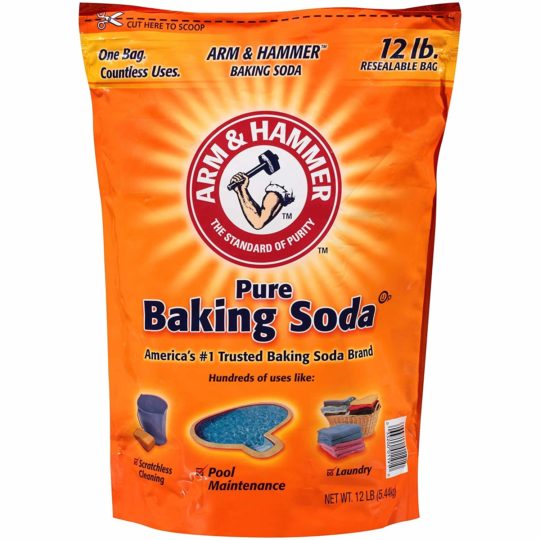
Baking soda is a miracle product. You can clean the house with it, brush your teeth with it, bake with it… and you can use it to tenderize meat! Baking soda breaks down meat proteins as it is absorbed. Sprinkle baking soda over the surface of the beef, rub it in and then let it sit (in the fridge) for several hours. OR, make a paste out of soda + water, coat the beef and let it marinate for several hours. Make sure to rinse the beef before cooking so that your steak doesn’t taste like baking soda!
Just like salt, baking soda will break down proteins as it’s drawn in. Two ways to do this: Sprinkle baking soda all over, rub it in a bit and then let sit (refrigerated) for several hours. You could also make a baking soda/water paste and slather it over the product. Let it sit for several hours. Rinse well before cooking to remove all the baking soda.
Vinegar
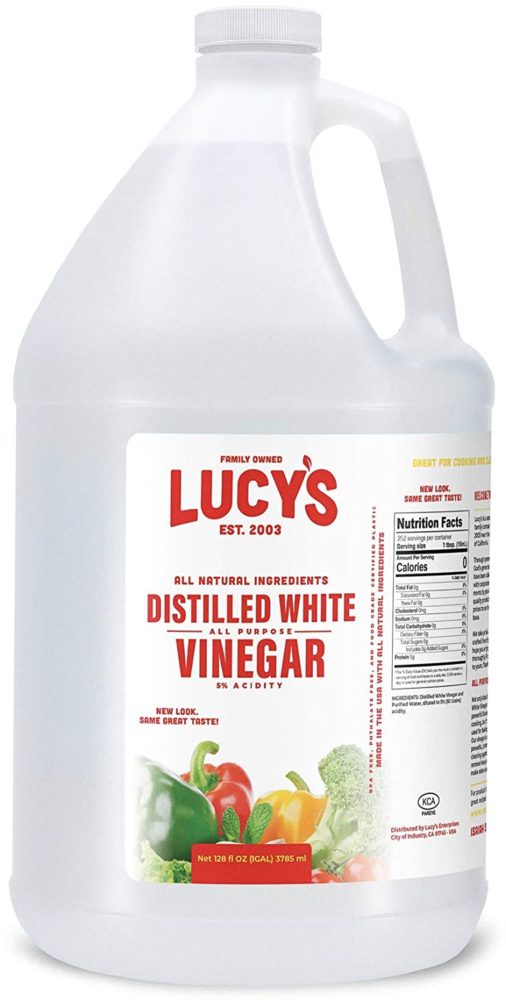
The acetic acid in vinegar breaks down meat fibers and makes them more tender and flavorsome. Add a tablespoon of white vinegar to your cooking liquids or soak your meat in vinegar before you cook it. Cook the beef in a glass dish or a non-stick pan, like cast iron and some other metals can react unfavorably with the acid. These are acidic liquids that soften muscle fibers (and add flavor too)Vinegar can be apple cider, balsamic or regular household vinegar. Just add a tablespoon or two of white vinegar to your cooking liquids and your roasts, stew meats, and steaks will come out tender and juicy every time. Another option is to pierce your meat all over with a fork and then soak it in vinegar for an hour or two before you cook it.
Frequently asked questions (FAQs)
What is a meat tenderizer made of?
Meat tenderizer refers to a naturally derived enzyme powder. The enzyme most commonly used is papain, which comes from papayas, or bromelain, which comes from pineapples (a tropical fruit in the bromeliad family). Meat is sprinkled with the powder, and the enzymes help to break down the meat fibers.
What enzyme tenderizes meat?
You can see that the main ingredient is Bromelain. Bromelain is made from pineapple and is just one kind of proteolytic enzyme that is commonly used in meat tenderizers. A proteolytic enzyme (aka protease) is a protein that digests other proteins by breaking them down into smaller pieces.
What enzyme in pineapple can tenderize meat?
Bromelain does. It is actually a mixture of two enzymes classed as proteases that break down proteins. These proteases target the large protein molecules in meats – specifically, the connective proteins called collagen – and break them down into shorter segments.
Conclusion
When using a strong acid-based recipe, use glass dishes since stainless steel can react to the acid which will affect the final product. If using a straight acid liquid (say apple cider vinegar, wine, or lemon juice), meat shouldn’t be allowed to stay in it for longer than two hours since the acidity will then begin to toughen it. If you want to marinate for a longer period of time, use a recipe that includes oil rather than a straight acidic liquid.

